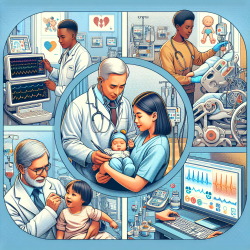In the dynamic field of special education, continuous improvement and adaptation are essential. One of the key areas that practitioners can focus on is understanding the intricacies of bilingual aphasia. The research article "Performance of Bilingual Cuban-American Aphasic Patients on a Task of Body Part Identification" by Lillian Glass offers valuable insights that can be applied to improve therapeutic outcomes for bilingual aphasic patients.
This study addresses the ongoing debate about which language is more resilient following cerebral insult in bilingual individuals. The findings of this research can help practitioners develop more effective therapy strategies by leveraging the language that shows better retention and performance in aphasic patients.
Key Findings and Their Implications
The study involved six non-aphasic and eight aphasic Cuban immigrants who were tested on their ability to identify body parts in both Spanish and English. The results indicated that fewer errors were made in the first learned language (Spanish) compared to the second acquired language (English). Specifically, the study found:
- Aphasic patients performed better in their mother tongue (Spanish) than in their second language (English).
- Both aphasic and non-aphasic individuals made more verbal paraphasic errors in English than in Spanish.
- The frequency of language use also played a significant role, with subjects who used Spanish more frequently performing better in Spanish.
Practical Applications for Practitioners
Based on these findings, practitioners can implement several strategies to enhance therapy for bilingual aphasic patients:
- Focus on the Mother Tongue: Given that the mother tongue shows better retention, initial therapy sessions should emphasize this language to build confidence and competence.
- Gradual Introduction of the Second Language: Once the patient shows improvement in their mother tongue, gradually introduce the second language to avoid overwhelming them.
- Use Familiar Contexts: Incorporate everyday situations and familiar contexts in therapy to make the transition between languages smoother.
- Monitor Emotional Responses: Pay attention to the patient's emotional ties to each language, as this can significantly impact their recovery and comfort level during therapy.
Encouraging Further Research
While this study provides valuable insights, it also highlights the need for further research in the field of bilingual aphasia. Practitioners are encouraged to explore additional studies and contribute to the growing body of knowledge. Key areas for future research include:
- Investigating the impact of different types of bilingualism (e.g., compound vs. coordinate) on aphasia recovery.
- Examining the role of emotional and affective ties to each language in the recovery process.
- Developing standardized tests and measures that can be used across different languages and cultural contexts.
By staying informed and engaged with the latest research, practitioners can continue to refine their skills and provide the best possible care for their patients.
To read the original research paper, please follow this link: Performance of Bilingual Cuban-American Aphasic Patients on a Task of Body Part Identification.










